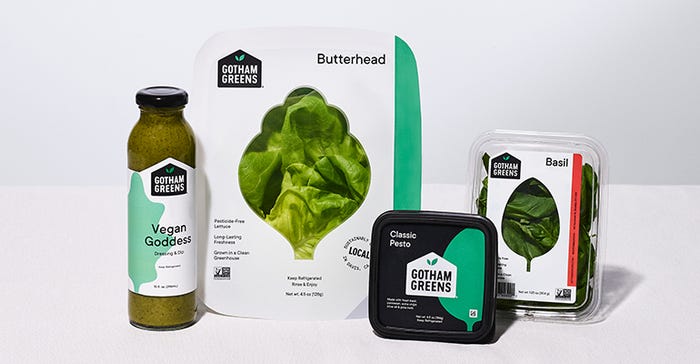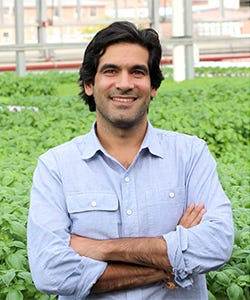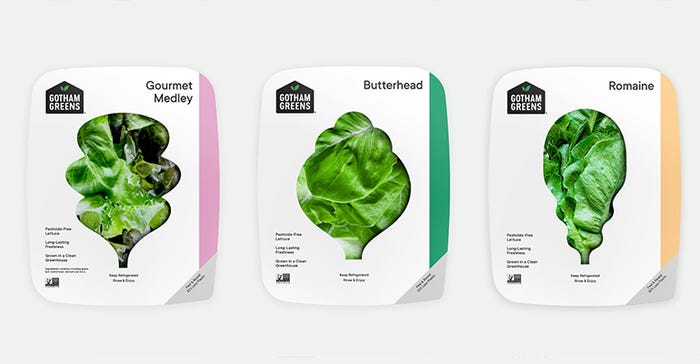B Corp Certification a natural step for hydroponic grower Gotham GreensB Corp Certification a natural step for hydroponic grower Gotham Greens
Since the brand was founded with one rooftop greenhouse, this leafy greens producer intended to have a positive effect on its communities and the planet.

Gotham Greens is known for its leafy greens, herbs, salad dressings, dips and cooking sauces—and its unique business model. What started with one urban rooftop greenhouse in Brooklyn, New York, grew to one of the largest hydroponic leafy green producers in North America, using up to 95% less water and 97% less land compared to conventional open-field farming.
Today, its national network of climate-controlled, high-tech greenhouses are found in cities like Chicago, Illinois; Denver, Colorado; Baltimore, Maryland; Providence, Rhode Island; and more. Recently, the company took the next step in its mission to contribute to environmentally sustainable business in America and became a Certified B Corporation.
Here, Viraj Puri, co-founder and CEO of Gotham Greens talks process, lessons learned and next steps.

Why did you decide to become Certified B Corporation?
Viraj Puri: When we started Gotham Greens in New York City over a decade ago, my co-founders and I wanted to build a business that did more than just generate profit. We believed business could be a force for good, and from the very beginning, it was critical that Gotham Greens have a positive impact not only on the planet as a whole, but also on the individual communities in which our greenhouses are located.
Our B Corp Certification comes at a pivotal time for Gotham Greens as we celebrate our 10th anniversary, the recent opening of our California greenhouse and our plans for future growth. B Corp Certification is the only third-party accreditation that measures a company's entire social and environmental performance. The certification adds in additional layers of accountability and transparency for our employees, customers, retail and foodservice partners, and investors as we continue to innovate our food system to build a better future for generations to come.
What sorts of initiatives did you already have in place that helped you achieve certification?
 VP: Sustainability has been in our DNA from day one, and going through the B Corp Certification process was an exciting opportunity to learn more about where we as a company excel, along with areas for continuous improvement. For example, we discovered that our team's commitment to health and safety goes far beyond other businesses in our sector, including our robust safety programs, worksite protocols and self-audit practices. We also verified that 94% of our inputs are sourced from domestic suppliers, and our company provides at least 75% of our leafy greens and herbs to local and independent partners located within 50 miles or less of our regional greenhouses.
VP: Sustainability has been in our DNA from day one, and going through the B Corp Certification process was an exciting opportunity to learn more about where we as a company excel, along with areas for continuous improvement. For example, we discovered that our team's commitment to health and safety goes far beyond other businesses in our sector, including our robust safety programs, worksite protocols and self-audit practices. We also verified that 94% of our inputs are sourced from domestic suppliers, and our company provides at least 75% of our leafy greens and herbs to local and independent partners located within 50 miles or less of our regional greenhouses.
During our certification process, Gotham Greens transitioned from being a C-Corporation to a Public Benefit Corporation. This legal structure creates accountability in our decision making that requires the consideration of all our stakeholders and prioritizes social and environmental values.
Many brands describe the B Corp Certification process as challenging. What were some of the most difficult parts of attaining certification, and what did you learn along the way?
VP: The B Corp Certification process encouraged us to really hone in on concrete, outcome-based sustainability goals for the future, and to think critically about what it will take to meet these goals. Of course, some changes can be made more easily and more quickly than others. Alongside our California greenhouse opening, we have introduced new resealable lidded film packaging for our salad greens, which reduces plastic packaging for our salads by more than 30%. Going through the B Corp Certification process helped us formalize a timeline for further plastic packaging reduction in the short and medium terms.
As a company that was founded with the goal of conserving natural resources and reducing food waste, we knew that our business model positioned us to do well in terms of the "environment" category. Even so, the assessment challenged our team to develop new tools to truly quantify our environmental footprint. This means regularly evaluating our environmental performance in key categories including energy use, emissions and resource consumption. It also challenges us to assess our impact related to our manufacturing operations, external supply chain and distribution practices.

What is your advice for a natural food brand that wants to become B Corp Certified?
VP: For any company interested in the B Corp Certification process, it is incredibly important to stay clear on what your core goals are as an organization. It is a long, intensive process that requires a lot of time, energy and problem-solving from your entire team, and you need to be ready to take on that workload without expecting shortcuts or easy answers. Lastly, while obtaining B Corp Certification is a milestone for Gotham Greens, it is not a signal to stop working toward important initiatives that will continue to create a positive impact for all of our stakeholders in the future. Our work continues.
What is next for Gotham Greens?
VP: Looking ahead, our goal is to bring the Gotham Greens brand to more states over the next several years. We're also working to increase our operational capacity at our existing greenhouses to allow Gotham Greens to expand our retail sales and meet the growing demand for greenhouse-grown produce. In addition to continuing to expand our line of fresh salad greens and herbs, we're also expanding our line of exciting fresh food products that celebrate plant-based ingredients as the main hero and inspiration, including salad dressings, dips and cooking sauces. In fact, we recently launched two dairy-free salad dressings with no added sugar—Vegan Ranch and Vegan Caesar—which are available in Sprouts and Whole Foods stores nationwide, as well as regional grocery stores.
Additionally, Gotham Greens is committed to several outcome-based sustainability commitments, including reducing plastic packaging for leafy greens and herbs by 40% by 2024 and 80% by 2030; achieving a reduction of 5% in our electricity use intensity by 2024; and reducing our Scope 1 and 2 greenhouse gas emission intensity by 5% by the end of 2024.
About the Author
You May Also Like



